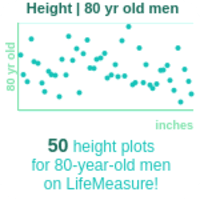Men Height chart for Seniors 80 years old

General Summary: 80 year old men height
In most cases, height measurements for 80 year old men will be in the range between 162 and 188 cms. The average height for 80 year old men is 175 cms, according to the CDC and anonymized data from users.
All Results
Enter your height measurements above to see how they compare
So far, we have recorded 0 height measurements for 80-year-old men on LifeMeasure!
(chart updates daily)
Health and Height Insights at 80 Years Male
Health and height are determined by a combination of lifestyle choices, genetics, medical conditions and postural defects. Changes such as bone density, sarcopenia, and stiff joints affect participation in physical activities and height, posture and overall wellness. You can slow down these factors through proper nutrition and adequate medical care, as it helps to maintain a strong physical foundation.
Height Development for 80-Year-Old Male
There are lots of factors that influence height for males at 80 years old, such as spinal conditions, hormonal changes, lifestyle choices and reduced physical activity.
Height Loss: On average, an 80-year-old male is expected to lose 1-2 inches compared to their peak adult height. This decline actually starts in the 30s or 40s but shows more in the later decades of life.
Average Height: The average height for an 80-year-old male is around 5 feet 7 inches due to natural height loss. Although bone health, nutritional habits and lifestyle can affect height,.
Factors Influencing Height Changes for 80-Year-Old Male
Spinal Compression: The intervertebral discs lose fluid content, which in turn leads to reduced spine length. Osteoporosis or vertebral fractures can reduce height by more than 2 inches most times. Partaking in exercise strengthens muscles that support the spine and improves posture.
Changes in Posture (Kyphosis): Kyphosis is a medical condition where there is a forward curvature of the spine. This is very common in older adults and can develop through osteoporosis or prolonged poor posture. Try out stretching routines, as daily stretching can help to revive the tightness in the chest and back muscles.
Bone health: Most men experience bone density loss at 80, as it decreases gradually as they age. A man may lose 20–25% of his bone density, which directly affects his height. Eat foods and supplements rich in calcium and get regular bone density tests as recommended by your health care provider.
Height and Health Insights for 80-year-old male
Anti-inflammatory Foods: Consume foods rich in omega-3s and antioxidants and diets low in processed sugars to reduce inflammation.
Adequate Joint Care: Consider taking supplements rich in glucosamine and chondroitin, as recommended by your healthcare provider.
Posture Support Devices: There are various devices that help support one's posture under the guidance of a healthcare provider.
Adequate Medical Treatment: Consult a healthcare provider to suggest ways you can treat and manage arthritis through medications or therapies. They can also help draft out exercise plans to keep you fit and in shape.
Engage in Balance and Stability Training: Partake in exercises like Tai Chi, gentle yoga and simple leg stands. Short strolls could also help under supervision, if necessary.
Balance Training: Poor balance increases the risk of falls and vertebral fractures, leading to sudden height loss and long-term health issues. Balance training improves stability, reducing these risks.
Make Use of Ergonomic Chairs: Make use of chairs that can provide adequate lumbar support. You can adjust and tilt the chair to ensure comfort and good sitting posture.
Weight Management
Weight management is an important factor for maintaining health and height in 80-year-old men. Overweight puts too much stress and pressure on the skeletal system, thereby increasing the risk of height loss and contributing to age-related health issues. Being underweight is also considered a problem, as it also weakens bones and muscles and this hastens the aging process.
Maintain a healthy weight by balancing food intake with physical activity. Focus on less strenuous exercises to reduce the strain on joints.
Conclusion
Various factors, such as postural defects (kyphosis), spinal disc compression and bone density loss, can significantly affect height, but with proper nutrition and regular exercises, these processes can be slowed down.
See more ages